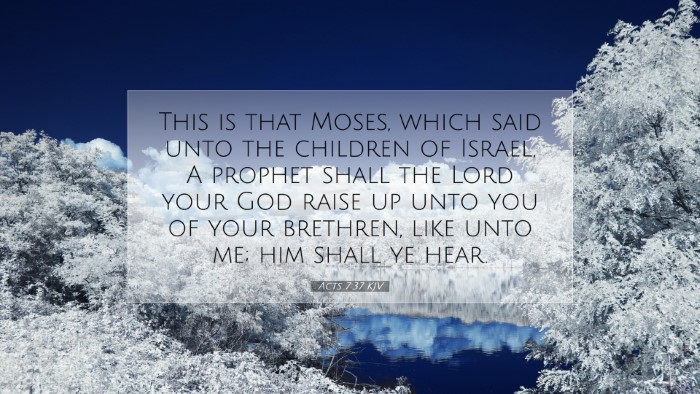Commentary on Acts 7:37
Bible Verse: "This is that Moses, which said unto the children of Israel, A prophet shall the Lord your God raise up unto you of your brethren, like unto me; him shall ye hear."
Introduction
This verse appears in Stephen's speech before the Sanhedrin, drawing a direct connection between Moses and Jesus Christ. Stephen references the prophecy delivered by Moses regarding a future prophet, which highlights the importance of prophetic succession in Israel's divine narrative and emphasizes the fulfillment of this prophecy in the person of Jesus.
Contextual Significance
Acts chapter 7 is pivotal in understanding the early Christian community's view of the Jewish faith. Stephen addresses the Sanhedrin, recounting Israel's history, particularly focusing on Moses as a figure of liberation. By citing Moses, he establishes a foundation for his claim that Jesus is the awaited Messiah.
Historical Background
Stephen’s speech encapsulates the history of Israel, with Moses as a central figure representing God's deliverance and revelation. The Sanhedrin, composed of religious leaders, finds itself challenged by Stephen's assertion that Israel had consistently rejected God’s messengers. Here, Moses' prophecy serves as a precursor to the rejection of Jesus.
Insights from Commentators
Matthew Henry
Matthew Henry emphasizes that Moses is an archetype of Christ. He points out that just as Moses was chosen by God to deliver His people from bondage, Jesus is appointed to deliver humanity from sin. The "prophet like unto me" phrase signifies characteristics like leadership, divine appointment, and a mission centered on the welfare of God's people. Henry notes that this foreshadows Jesus' role, extending the notion of prophetic authority in a new covenant context.
Albert Barnes
Albert Barnes elaborates on the translation and the meaning behind the term "brethren." He states that it refers to the community of Israel. Barnes asserts that this divine promise of a prophet establishes continuity within God’s dealings with His people. He highlights that the Jews were looking for a Messiah who came with the authority of Moses, and Stephen's declaration indicates Jesus as the fulfillment of this promise, engaging the audience's expectations of prophetic tradition. Barnes warns the audience of their ancestral heritage of disobedience to God's sent messengers, a theme echoed throughout Stephen's speech.
Adam Clarke
Adam Clarke offers a linguistic analysis of the phrase "like unto me." His commentary brings attention to the broader implications of Moses' words, indicating that the new prophet would not only be similar but would surpass previous prophets in authority and revelation. Clarke also discusses the implications for early believers who recognize Jesus as the ultimate fulfillment of this prophecy, underscoring how Jesus, in His ministry, embodied the very essence of what Moses prophesied. Moreover, Clarke draws a stark contrast between the reception Moses received in His own time and the rejection faced by Jesus.
Theological Implications
Theologically, Acts 7:37 serves as a bridge connecting Old Testament prophecy with New Testament fulfillment. The verse denotes the authority of Jesus in the spiritual lineage of Israel and underscores the faithfulness of God in raising prophets for His people. It serves as an admonition to recognize divine authority in the prophetic and apostolic traditions.
- Prophetic Fulfillment: The verse points directly towards Christ as the fulfillment of prophetic tradition.
- Continuity of Revelation: Acts 7:37 asserts the idea that God continues to reveal Himself through chosen individuals, establishing a theological continuity.
- Call to Obedience: The exhortation to "hear him" highlights the importance of responsiveness to God's message, paralleling the Jewish tradition of responding to prophetic words.
Practical Applications
For pastors, students, and theologians, Acts 7:37 serves as an essential reminder of the importance of prophetic voices and the need for discernment in following God's chosen leaders. The call to recognize Jesus as the ultimate prophet challenges believers today to consider how they receive divine instruction in their lives. It also invites reflection on the legacy of prophetic voices throughout history and the contemporary manifestations of such followed by the demand for obedience and acceptance of Christ as our guide and Savior.
Conclusion
Acts 7:37 encapsulates significant theological and historical truths, linking Moses to Jesus and establishing a clarion call for believers to heed God's voice through His prophets. Understanding this verse in its broader context helps scholars appreciate the intricate relationship between the Old and New Testaments while challenging every generation to respond faithfully to the message of God’s chosen representatives.


